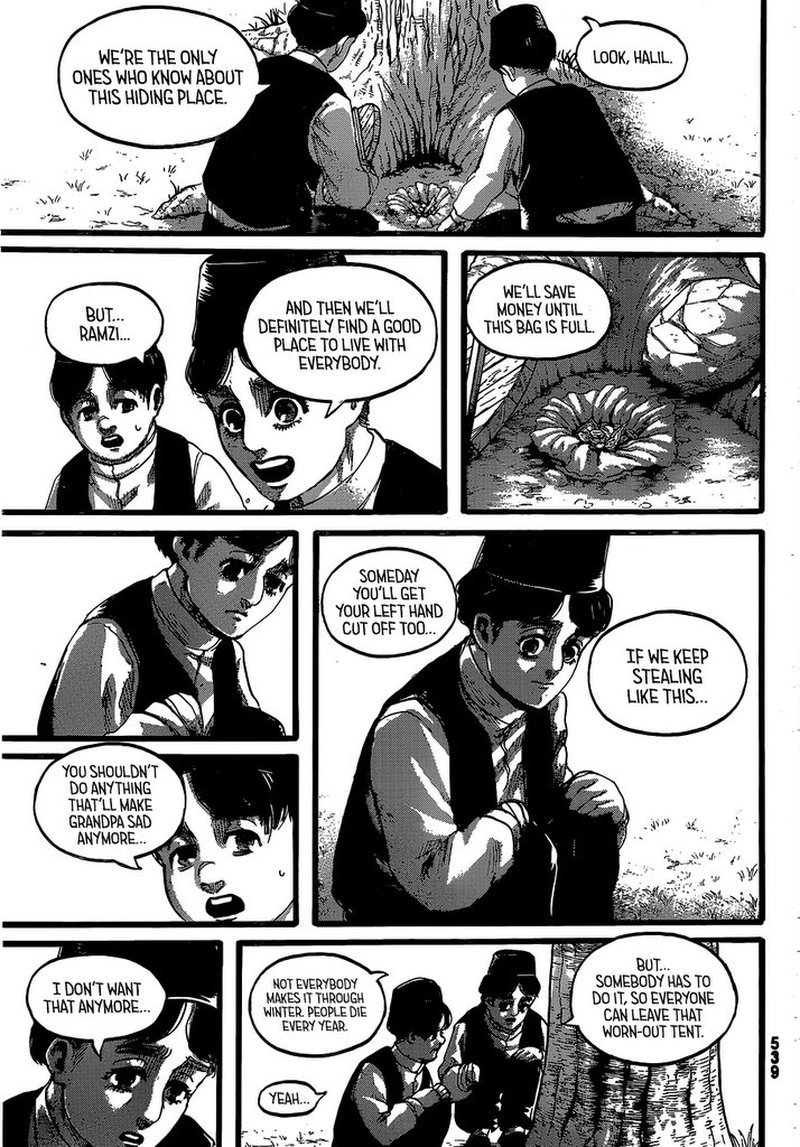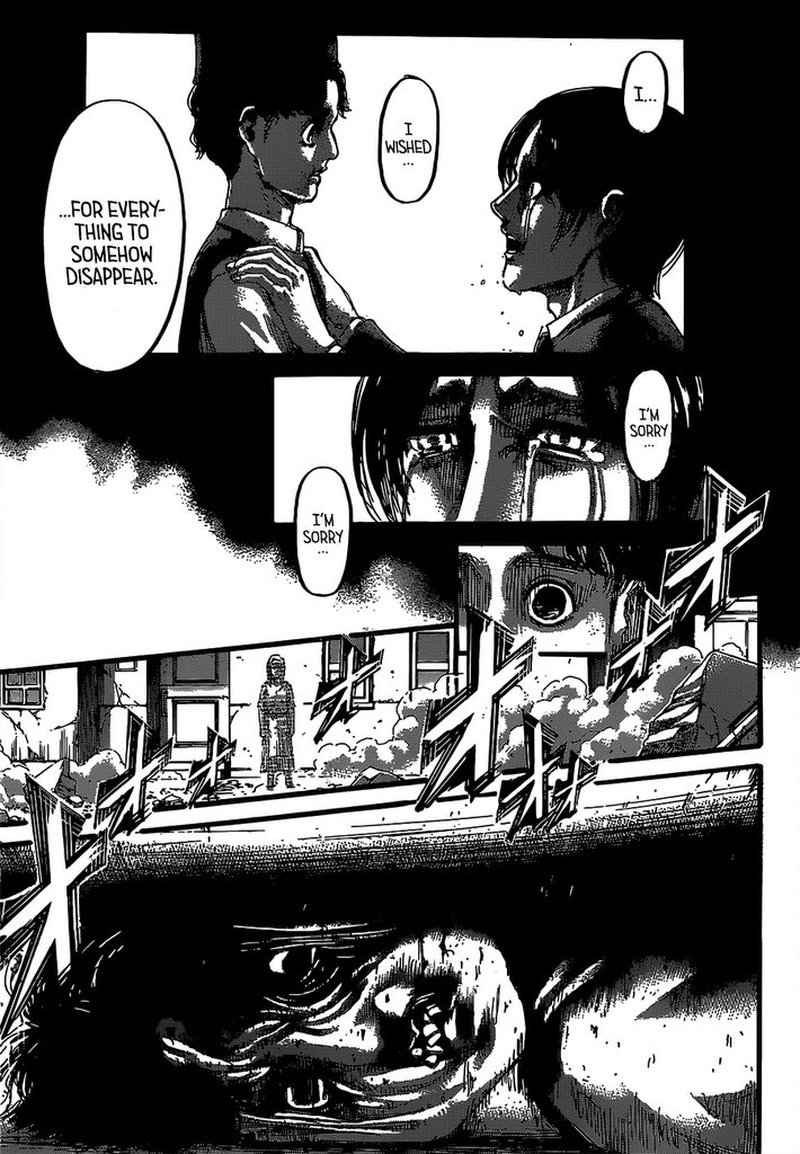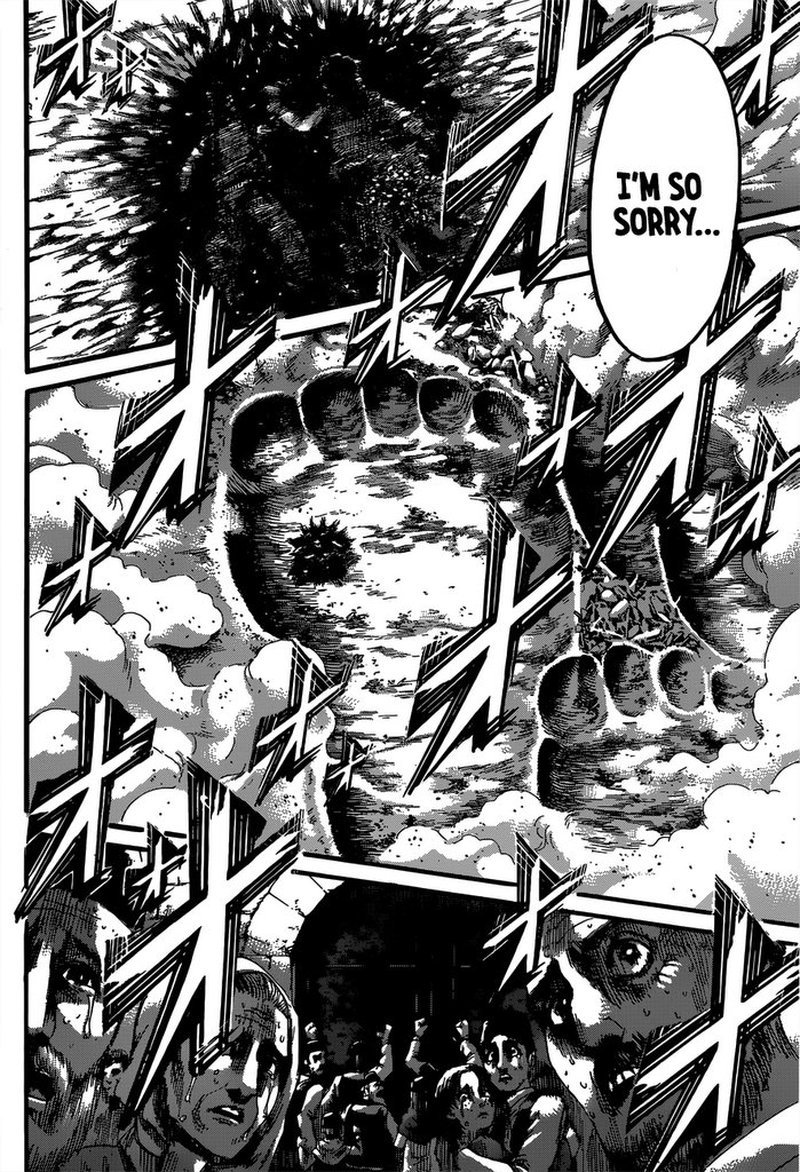a gift
*all images are taken from Attack on Titan chapter 131, written and illustrated by Hajime Iseyama. none of the media is owned by me*
Attack on Titan is one of the best manga to come out in recent memory but it is bogged down by a convoluted plot, contradictory exposition of its themes, questionable character development, and a random twist that does nothing to diminish or enhance the plot. It just kinda happens. AoT at its core, however effectively examines dread, uncertainty, war, and freedom through its primary character Eren Jaeger. I hope that readers question how capable we are of creating a positive world for future generations.
Written here is a review by Anilist user LN03. The ad hominem thrown at Hajime Isayama is unpleasing, but I found myself agreeing with their criticism of Historia’s role in the plot, Eren’s contradictory behavior, Mikasa’s lack of growth, what Ymir’s love for King Fritz meant, why war criminals are just left to chill, how Zeke died, why Reiner kept getting beat(all Ls), and why Eren felt his path appropriate. What I find most interesting is that anyone could view the ending of this series hopeful. For many, this story is flawed because there is no way that the protagonist can succeed in creating this happy ending Isayama has been building. I don tbeleive we are suppose to find Eren's actions reasonable though. Nor would a happy outcome make sense given the will of Ymir.
Justice.... Nah. Just Us
Attack on Titan’s end hinges on its uncertainty. For me, AoT is a story of dread, perhaps freedom. An interesting question I found asking myself concerning justice was if people who have committed genocide lead Earth’s last people? I say they get tossed in jail at least. But we have to acknowledge to the world of possibility Eren provided in ridding the world of Titan powers, allegedly. do not like the ending, personally, because seeing a kid too stupid to be safe get powers and destroy the world for vengeance is heartbreaking. The rumbling would always happen at some point because an island of GIGANTIC TRANSFORMING HUMANS THAT MAY GO MINDLESS AND START EATING HUMANS ARE DANGEROUS ESPECIALLY WHEN THEY HAVE A BUILT-IN MECHANISM THAT SAYS THE BIGGEST VERSIONS OF THOSE MONSTERS WILL LITERALLY STOMP THE REST OF THE WORLD TO DEATH IF THEY ARE INVADED. Couldnt we do away with them?
 here we find children in a similar predicament aas or protganist doing what they feel they must
here we find children in a similar predicament aas or protganist doing what they feel they must
If we know Eren then we know he would destroy the world to appease his sense of justice. Eren was always obsessed with joining the military and would chide Hannes for relaxing on his job. As a child, Eren thought himself bold enough to save Mikasa and did not hesitate to ruse the captors so he could strike but he was not built like an Ackerman so he got beat up. This marks the beginning of the pattern of Mikasa saving Eren because he is a sigma idiot who will die before saving those he cares for.
Empathy
From the beginning, I never understood why this nationalist asshole who is too self centered to admit his own weakness was centered as the main protagonist. For me, there was no way this story could have a peaceful ending. Eren is so cowardly that he’d rather die than believe in himself (plea to Historia Underground), and would rather destroy the world than talk to others. Shit, if Eren didn’t get humbled during the training corps arc any attempt at character growth would be questionable. Before everything, Eren was filled with rage at the hapless despair Paradis island faced. Eren is the violent impetuous child he always was. Willing to risk his life without a concept of the value of life. Eran’s sense of dread leading to the underground diamond cavern superficially stems from jealousy and a sense of powerlessness. I could never love nor unconditionally champion Eren. What I regret is not empathizing with Eren’s despair. His sense of being powerless child in the face of atrocity.


While going through the communiies outrage at AoT’s ending, I begin to understand something about why the story resonates. It is only when one believes a better outcome can be achieved that one might find the strength to feel pity for themselves and others. I thought there were many ways AoT could have ended better. But Eren never saw a world where peace was meant for him. Paradis was never liberated by civil war. There was no non-violent protest that challenged genocide or prejudice in Marley. Eren thought Paradis to be the only refuge in the world. The outrage of knowing the world outside stood by and actively participated in the creation of his grief entrenched the despair he had felt. Genocide by Paradis Titans or by Marley, sterilized by Zeke, there are no happy endings. At best, the titan powers can be done away with. Alledgedly. This was the tragic form of Iseyama’s narrative.
Life is complicated. We collectively make decisions every day that could impact the lives of every living creature on this planet. We are in the middle of a climate crisis that we have not yet collectively accepted, but is happening slowly. We can destroy our planet at any time with nuclear weapons. We can create our rumbling. We will eventually. How then, can we know what good needs to be done? How do we preserve the future? Who are we to do so? What should be preserved? What is the right way to live in the face of extinction? Why can’t a unifying, unselfish love be present in these times? What do we want for the future?
The gift Isayama provides for us is the deep-seated hope all characters share for a safer world. A hope that persists past the rumbling.